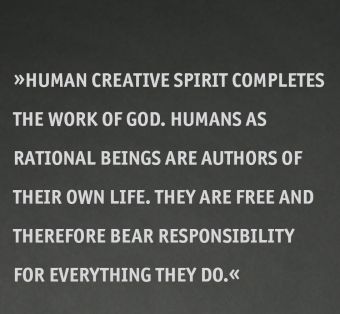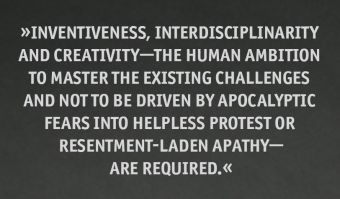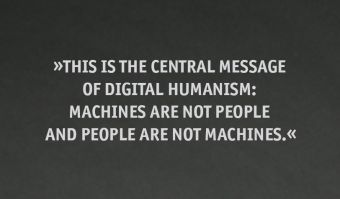
Design is an attitude
Forbes Top 50 Women in Tech, Strategy Advisor to European Commision and Parliament and Founder of ElectroCouture, ThePowerHouse and FNDMT, Brussels

Design is an attitude
The renaissance of an interdisciplinary mindset
This article pays homage to the legacy of artist and Bauhaus professor László Moholy-Nagy and calls for a renaissance of his mindset, a mindset that incorporated new and revolutionary ideas about technology, education and attitude.László’s mindset is perhaps best encapsulated in maxims that abound in his prolific writing and which are pithy, catchy and easy to adopt as principles of design. Design is an attitude. Everyone is talented. László’s ideas about design were—and still are— democratic and inclusive. Everyone who can get involved in the design process should be involved—and that’s especially true when confronting the complex issues we face today such as sustainability. László was relentlessly experimental, but he was also very practical and his ideas very practicable. He documented his work fastidiously and he wrote prolifically, meaning his ideas, his guidance could be put into practice.
What is design?
So, what is design? Wow, we could talk for 10 hours—for 10 years!— about this. But what we can say for certain is that design is always an opportunity to improve. And for the designer, opportunities abound—it’s just a matter of seeing them. Looking, for instance, at discussions around sustainability, we need to find new solutions and new ways to tackle problems in order to build a better world. We need to solve problems created by old systems. (Though imagine that we had actually tried to avoid the problems before they had turned into the big issues they are now…)The sort of design I’m interested in is inspired by the Bauhaus. The Bauhaus was not just a school of design—it was away of working, of living, of being. One of my favourite aspects of the Bauhaus, a school of which László founded in Chicago, is the training that all of the students had to go through. Every student needed to know all of the machines in the workshops—not only how to use them, but also how to maintain them and how to repair them. Isn’t that wonderful? When you know how things are made, how machines work, it gives you power and freedom at the same time.
"Everyone is talented"
Back then it was the sewing machine. Today it’s the computer. Both have generated an impact beyond their intended purposes. I call this potentially extended impact #reprogramthemachines, because every machine can do more than the purpose it was originally designed for. It’s the same with our brains. We can do so much more than what we’ve been trained for before. And everyone is talented. László argued that, so long as they are interested in and dedicated to their work, people can tap into their natural creative energies. That means everyone can get involved. And in the case of the complex issue of sustainability, everyone—every possible angle—should be involved.We also need to look in from the outside. The fashion industry, for example, is an industry which was siloed for a very long time, relatively protected from outside opinion and criticism. A t-shirt requires around 25,000 litres of water in order to it. There is something very wrong with this picture but sometimes it takes an outside view to see this wrong.
Looking at other industries which have been disrupted in the last 10, 15 years—transportation, music, movies—the startups that disrupted them didn’t emerge from the traditional industry. Spotify, for instance, didn’t emerge from traditional radio. Instead, these companies were founded by people who were frustrated with the status quo and who dared to question it, asking, Why don’t we try things differently? They used tools to fix the problem, digital tools, and involved people from across disciplines. When everybody is talented, everyone can get involved. No elite, no club, just an equal playing field.
"Designing is not a profession but an attitude”
I love the emphasis on attitude in the Bauhaus. Everybody can have an attitude, it’s a totally level playing field. It’s about lifestyle, it’s about seeing opportunities everywhere. Everyone should and can have the attitude to change and to design. And everybody can and should have the opportunity and attitude to be sustainable.
That means it is the designer with the right attitude who brings everything together.
The problems we have to solve now—and the problems we need to avoid in the future—are very complex and very diverse. They’ve been created because industries have been trapped in silos with no communication between them. So, for me, it’s the designer with attitude who can bring everything together—and we are all designers. We are bridge-makers, traversing industries, silos, technologies and mindsets to bring everything into a coherent and intelligible picture.


"The illiterate of the future will be the person ignorant of the use of the camera as well as the pen”
Remember László’s telephone pictures? Those pictures started a whole new discussion: What if, all of a sudden, a designer uses technology to create art? Is he still an artist?. Back then, photography was a new technology and László completely embraced it. But let’s not forget the pen which was, at some stage in history, a new, super smart piece of technology. The camera is to us now what the pen was for László. For us, the camera is a standard, familiar tool, like the pen. Perhaps new technologies like algorithms and artificial intelligence perhaps have a similar novelty for us that the camera had for László. The question is how we work together to use these tools. So, ladies and gentlemen, how do we do this?
Work. Go and travel. Go and talk with other people if you’re an architect or builder, in the loosest sense of those words. Or if you’re a writer, a musician, a content creator. Explore space, explore our oceans. Have you ever talked with a programmer, a software engineer or a data architect? I highly recommend it because a great piece of code can be as exciting as a novel and as impactful as a symphony. So, wherever you go, whatever you do, do something different. Talk with other people. Make things better, together.
Lisa Lang
Lisa Lang has gained recognition as one of Forbes Europe’s Top 50 Women in Tech, and has been listed as one of the 50 most important women for innovation & startups in the EU.She founded highly recognized companies like ElektroCouture, ThePowerHouse and FNDMT who are dedicated to push innovation within the creative and innovative industry eco systems. Lisa Lang is a direct adviser for creative industries, digitalisation and entrepreneurship for the European Commission on several high-level advisory boards, including Pact for Skills, Industrial Forum and the US/EU Trade & Technology Council.
Lisa Lang is on the advisory board to the Zurich university of arts as well as a policy advisor for Fashion Innovation Centre Sweden. She regularly teaches business and innovation strategies at the Porto Business School and has been given guest lectures at TEDx Athens, KryptoLabs Abu Dhabi and Oxford University.
Picture © VOGUE Greece

